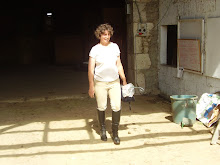I have finished watching "The Green Mile" in German with German subtitles. At first I watched the same scene over and over again, trying to understand as much as possible. I wrote down words that seemed important, but I resisted the temptation to look them up in the dictionary.
Charlotte sent me three German films to watch next. She kindly included a short letter in English with the same letter in German. This was very helpful and has convinced me that bilingual editions are worthwhile. I always scorned them because whenever I picked one up I automatically read either one language or the other. However, I poured over Charlotte's letter in German and enjoyed understanding almost all of it, looking at the English only for the few words that I didn't understand. Please bear in mind that, being a teacher, she knew how to express her ideas in simple phrases that I could understand.
After half a dozen viewings of the first scene of the film, up to the arrival of John, I decided to watch the rest of it in one go. I also decided to stop writing down words that I didn't understand. Instead I wrote down entire phrases that came to me and which I understood. Because as I watch and listen, I'm beginning to realize that I'm not understanding individual words as much as entire phrases. Ich bin müde. Red mit John. Er pisst mich an. Du bist ein böser Mann. I'm sure that I would not have understood any of these out of context. But when I heard them and read them the meaning was quite clear.
I'm wondering if infants first become aware of words or phrases. I've noticed that my bilingual dog, Kribi, who understands both "On va se promener" and "Do you want to go for a walk?" definitely reacts to the complete phrase. If I say "walk" or "promenade" in isolation she cocks her head and looks quizzical, while the complete phrase has her jumping up and down and skipping circles around me. As a teacher I'm more and more convinced that memorizing lists of isolated words is a great waste of time and effort.
I feel like an archeologist, digging up vestiges of the German I learned in class 50 years ago. I'm amazed to find so many chards in fairly good condition. And I doubt very much that I could do the same in Spanish, although I only took one full year of German and three years of Spanish. My German teacher spoke to us only in German and tried to make it comprehensible. We did a lot of guessing because she translated nothing. I suppose, in 1963, that she was using the Natural Approach as it was then understood. My Spanish teacher rarely spoke in Spanish. We memorized vocabulary and grammar rules and translated.
My impression is that my subconscious stored the German which I acquired in a distant nook of my brain, so that I'm now able to excavate it, whereas the Spanish I learned, like dust and cobwebs, has long been blown away by the winds of time. Another difference between acquired language and learned language is that I remember my German classes with pleasure, with sufficient pleasure that I've often thought I would study it more some day, whereas I've never been tempted to use Spanish, even though I live only a few hours away from Spain, I spent part of my honeymoon in the Canary Islands and I have several friends who teach Spanish. When I hear spoken Spanish it's just noise. I have nothing to show for the three years I spent conjugating verbs. I had good marks in both classes, so it's not a question of being successful or not. I did what the Spanish teacher asked and passed her tests with A's. I did not acquire Spanish.

No comments:
Post a Comment